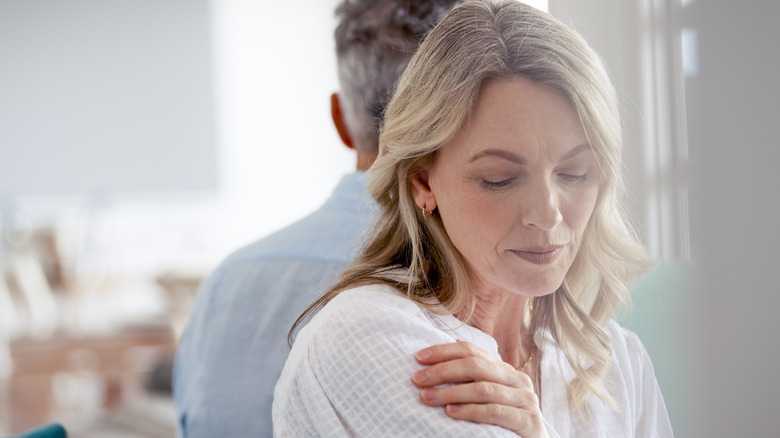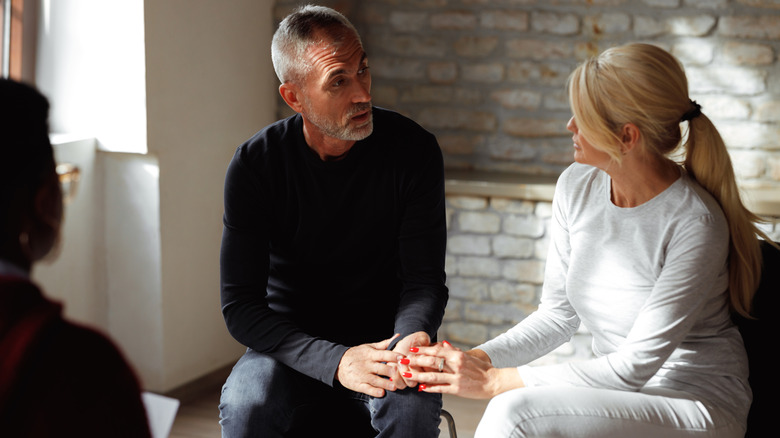How Menopause Might Affect Your Sex Drive, According To A Gynecologist
Menopause can affect the body in numerous ways — our libido included. "A decreased sex drive can occur throughout our lives, but can be more common around menopause," said Suzanne Weber, MD, gynecologist and menopause specialist, in an exclusive chat with Health Digest.
"According to the North American Menopause Society, up to 12% of women in midlife (age 45-64) report low sexual desire," Dr. Weber states, citing hormonal changes as one potential contributing factor. "Declining estrogen levels can cause bothersome hot flashes and night sweats that lead to disrupted sleep, fatigue, and mood changes, which can have a huge impact on sexual interest," she explains. "Decreased estrogen levels cause reduced blood flow to the genitals and thinning of the vulvovaginal tissues, which may lead to bothersome vaginal dryness and pain with intercourse," she adds. "Some women may also experience decreased genital sensitivity and delayed arousal and orgasm. Pain and sexual difficulties, of course, can lead to decreased sexual interest."
Dr. Weber explains that this collection of symptoms, along with burning sensations, reduced lubrication, and urinary urgency, is medically termed "genitourinary syndrome of menopause."
The role of mental health and natural aging
Dr. Weber goes on to tell us exclusively that one's mental health may also be a contributing factor. "Many women experience an increase in anxiety or depression around midlife and menopause, and medications used to treat these conditions may have side effects including decreased interest in sex and delayed or even inhibited orgasm," she explains. "Other causes of a decreased sex drive at menopause may include life stressors (work, kids, aging parents) and body image concerns due to weight gain."
Dr. Weber adds that the natural aging process may also play a role in one's lowered sex drive during menopause. "Although not directly related to menopause, an age-related decline in testosterone may contribute to some women's decrease in sexual desire and motivation," she states. "However, there is no level of testosterone that correlates with decreased libido."
However, it's not just women that can be affected by these changes over time. "Midlife changes can affect men's sexual function too, and some couples mutually phase out sexual activity at a certain point or change their form of sexual intimacy," Dr. Weber notes.
Methods for boosting libido affected by menopause
"A woman should seek help from her gynecologist if she is experiencing bothersome menopause symptoms that are impacting her quality of life," Dr. Weber tells Health Digest. "If she is experiencing vaginal dryness, an over-the-counter lubricant during intercourse and a vaginal moisturizer used a couple of times weekly may help," she suggests. "If these don't help, local vaginal hormones can improve vulvovaginal symptoms. Most women can use these safely but should consult with their gynecologist."
She notes that there are also certain supplements that may be helpful too. "There are some supplements that have been shown to increase genital blood flow and arousal, which increase a woman's interest in sex," says Dr. Weber. "Some women may consider using off-label testosterone, and there is an FDA-approved prescription to treat Hypoactive Sexual Desire Disorder in premenopausal women that has shown benefit in postmenopausal women," she states. In addition, take a look at any medications you may already be taking. "A woman should take a critical look at her medications to see if any may be causing sexual side effects," Dr. Weber encourages.
Partner communication and seeking professional help
There are also things someone can do in their day-to-day life to help boost sexual desire. "Lifestyle changes including stress reduction techniques, regular exercise, and getting quality sleep can improve fatigue and mood which, in turn, can increase feelings of well-being and sexual interest," Dr. Weber shares. "It's important to communicate with one's partner about any sexual needs and consider carving out dedicated time for intimacy," she goes on to suggest. "Many women find they don't think about having sex, but with some quality time and sensual touch, they can be aroused and become interested in sexual activity." For some, this may include trying something new. "If a woman has been in the same relationship for a long time, sex can naturally become less exciting over time, so a couple may wish to bring novelty to their sexual relationship by incorporating different types of touch, sexual toys, or other pleasurable endeavors."
"Aside from seeing her gynecologist to address menopausal symptoms, a woman may need to see a professional therapist to discuss any relationship issues, mental health concerns, or work through a history of trauma or abuse," Dr. Weber points out. "A couple may find working with a sex therapist helpful, especially if one partner's libido or other sexual concern is affecting the relationship. Many women worry that their lack of sexual interest will anger or hurt their partner, [or that] that her partner may wish to leave the relationship or seek out a new sexual partner." Professional assistance can help a couple address these concerns head-on.
Menopause does not guarantee a decreased sex drive
If no clear cause can be identified for a decreased libido, Dr. Weber says there may be a medical component in need of addressing. "Bothersome decreased sexual interest or arousal for 6 months in the absence of any identifiable cause may indicate a diagnosis of Hypoactive Sexual Desire Disorder (HSDD), and she should see her gynecologist to discuss treatment options."
However, it's important to note that not all people who enter menopause become dissatisfied with their sex life. "Many women will continue to have a satisfying sex life after menopause," Dr. Weber emphasizes. "According to the 2022 National Poll on Health Aging, 53% of women ages 50-64 were sexually active and 30% of women ages 65-80 were sexually active," she says. "Overall, 62% of women between the ages of 50-80 were satisfied with their sexual activity." Even more, some people may find that their libido actually increases as they age, she states. "Some women report they have an even more robust sexual interest after menopause, which may be due to no longer worrying about pregnancy and grown children moving out of the house," Dr. Weber concludes.





